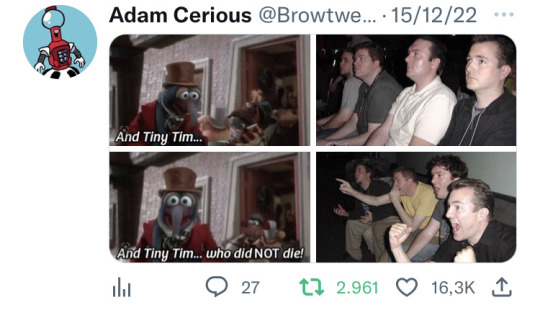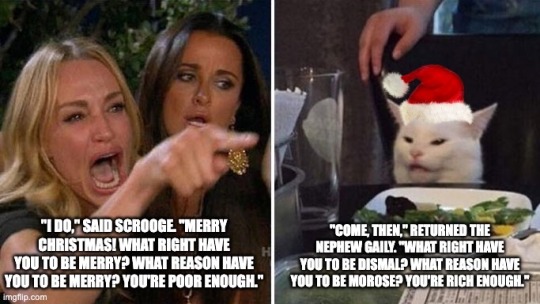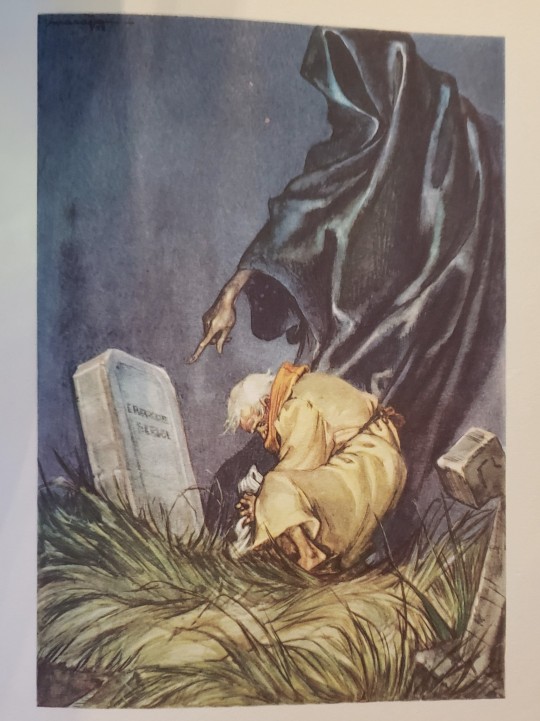#dickens December
Text
one of the things i love about ebenezer scrooge, and a christmas carol in general, is that, unlike most fictional rich people, scrooge doesn't allow himself the luxuries that he denies to others.
like. he is enormously wealthy, but does he spend his money on good food and nice things and indulgences? no. he keeps his house dark because it's cheaper to not light things, he eats gruel, he barely even makes a big enough fire to heat himself, let alone the room. he scrimps and pinches pennies everywhere he can - including in areas that other people would consider "necessities" rather than "luxuries."
the story of a christmas carol is as much about ebenezer scrooge coming to realize that his misanthropy and miserliness is making himself as miserable as it's making everyone around him, and learning to once again take joy in living in a way he hasn't allowed himself since he was a boy.
it's genuinely cruel to ebenezer scrooge to compare him to assholes like elon musk and jeff bezos.
for all that he is a terrible, terrible person, at least scrooge isn't a damn hypocrite.
#ebenezer scrooge#a christmas carol#dickens december#yes i have a soft spot for terrible people who hold themselves to the same exacting standards as they hold everyone else#scrooge and javert are side by side and holding hands in my little heart
27K notes
·
View notes
Text
Boomers: Grumble grumble, young people don't read the classics, they're always on the tiktaks and their goddamn phones, mutter grumble bah.
A bunch of dorks on tumblr: Where is my good friend Jonathan? We haven't heard from him in a while. Victor, you are a bad parent! Take responsibility for your giant corpse baby! Man, I love Dickens' descriptions. Alas, poor Ogilvy. A trip to Jurassic Park? Sure!
#tumblr book club#dracula daily#frankenstein weekly#daily war of the worlds#dickens december#jurassic park daily
2K notes
·
View notes
Text
A few different people have been observing that Scrooge begins to change more quickly in the book than is often shown in adaptations. The Spirit of Christmas Yet To Come isn’t the one crucial factor breaking his obstinacy, but rather a final message to drive home a point that Scrooge had already become receptive to. I want to trace the shape of Scrooge’s progress over the course of the book and see what it reveals. (There will be some ‘spoilers’ here, since the story seems fairly universally known even among those who are reading the book for the first time.)
After Marley’s appearance, he is disturbed and discomfited, but still trying to hang onto denial and not face what he’s been told.
With Chistmas Past, adaptations often treat it like a psych session - see, you hate Christmas because you were so miserable during it. But in the book, that isn’t the point at all. Scrooge sees times when he was unhappy as a boy, but he also sees what comforted him during those times - reading and imagination, which his adult self would dismiss asfrivolous and unprofitable - and recaptures his joy in those things. He sees times when he was happy, like at Fezziwig’s Christmas party. And he sees how he’s become the kind of person who made his younger self unhappy rather than happy, and how easy it would to be otherwise.
He sees himself asan unhappy child, and wishes that he’d been kinder to the young boy singing carols at the door. He sees himself happily employed with a kind, generous and personable employer, who could create a vastly more pleasant workplace climate at trivial expense, and wishes he’d been nicer to Bob Cratchit.
And then he sees Belle, and is shown that his unhappiness is of his own making and the consequence of hus own choices. His being the selfish, avaricious person he is is not the consequence of Belle breaking up with him; it is the cause of it. She saw him already becoming that person, and chose not to follow him in that path. Her choices left her a happy, loving and loved woman; his left him unhappy and alone. Scrooge cannot bear this, and rejects and fights the spirit rather than face it.
But he has nonetheless already begun to change. Whereas he initially did not want to go with Christmas Past (“a night of unbroken sleep would be more conducive to [my welfare]”), he willingly goes with Christmas Present and expresses the desire to learn and benefit. He sees people in all manner of circumstances, good and bad, choosing to take joy in each other’s company and the comforts, small or great, around them. Many adaptations fail in this, focusing Scrooge’s attention on the idea that people dislike him (Mrs Cratchit; his nephew’s joke) but in the book Scrooge clearly greatly enjoys his nephew’s party, the nephew is being good-humoured and generous and expresses his goodwill towards Scrooge, and Scrooge doesn’t mind the joke at all. He sees the Cratchits making the best of what they have, and how he is making their lives harder than need be. He sees, in many ways and places, how he could be making others happy and being happy himself, rather than making evrryobe miserable, and it is an appealing picture. And Present calls him out, several times, on his past words and sentiments, and Scrooge repents them.
By the time he meets the Spirit of Christmas Yet To Come, he is already willing and prepared to change, and making deliberate plans to do so. The thing that I think is emphasized through the scenes with Yet To Come, as a driving home of the point, is that Scrooge’s actions up to this point have not only made him and others unhappy - they are an utter failure at getting Scrooge the one thing he had prioritized: wordly security, respect, and dignity. In Belle’s words, his turn to avarice in his youth was in hopes of avoiding the “sordid reproach” that the world has for poverty. He was fine, and even pleased, with being feared rather than loved - what he did not want was to be patronized, despized, looked down on.
And now he sees where that got him! His business partners don’t even care to attend his funeral. Men whose respect he hoped to have gained don’t even give him a second thought, and for the brief moment they do, think ill of him (“Old Scratch” is Victorian slang for the devil). His chambers and even his body are plundered (tomorrow’s reading is even more graphic about this, in some lines, than most adaptations). He’s buried in an obscure, untended, weedy churchyard, because no one cares enough about him to make other arrangements. He has none of the worldly respect, regard, dignity for which he turned to money as a protector. Past and Present showed that he was wanting the wrong things; but Future shows him that he wasn’t even achieving the things he thought he did want, amd was in fact achieving their opposite.
The point of Future, then, is not to convince Scrooge to change. He has already chosen that he desires to change. Future alone, without the earlier spirits, would be supremely ineffective; showing Scrooge that his servant and the people around him hate him, without first showing him that he can be happy and make other people happy, would only make him more of a misanthrope. This is not a “scare ‘em straight,” as some adaptations play it. The point of Future is as a final guard against backsliding, against regret: you are losing nothing by changing, because your current path is losing you even the paltry things you sought to gain by it.
Also, I hadn’t really registered this on previous reads, but this is the very near future - the Christmas one year after the period of the book. This is never stated outright, but Christmas Present says of Tiny Tim, “If these shadows remain unaltered by the Future, none other of my race will find him here” - meaning, no future Christmas. And, in the visions with Christmas Future, Tiny Tim has died only a few days ago. In the words of Dante (paraphrased) “the time was perilously short for turning.” The Spirit of Christmas Yet To Come doesn’t teach the lesson - that’s the previous spirits - but he makes sure it sticks.
3K notes
·
View notes
Text
I'm seeing things that I - wonder don't make it into ANY adaptations, and it's odd seeing that there's a consensus of what does and does not make it. This scene where Scrooge demands to see proof that his death moved someone and it cuts to the family who get to keep their house because his death has delayed his filing of foreclosure papers until they can make the delinquent payments is one I think should be making more rounds.
2K notes
·
View notes
Text
I know they are jokes but I still utterly disagree with the people in the Dickens December tag going "Scrooge has a point/Scrooge is a mood" etc.
Because the problem with Ebenezer Scrooge is not that he dislikes Christmas and hates people forcing it on him, or that he refuses to give money to an unknown charity banging at his door.
The problem with Ebenezer Scrooge is that he is everything wrong with capitalism.
Scrooge doesn't refuse to participate in charity because he thinks it's a sketchy business and social problems should be addressed systematically at a higher level: he simply thinks any charity is a waste of money because to him, the problems are already taken care of. Poor people should be in prison or put to work, sick people should be in prison or in hospitals or even better, should be dead, and at the end of the day it's not his problem because he worked his whole life and he is perfectly fine and people die every day, so who cares.
And Scrooge doesn't shut down Christmas because Christmas is an over saturated, inescapable commercialised hell that he doesn't believe in. He hates Christmas because he dislikes anything even vaguely joyous, because joy doesn't bring money, or even worse, it requires money to be spent.
The only thing that counts to Scrooge when the reader meets him is to make money, and that drive shuts down any compassion in his heart. The more money he makes, the more miserable he becomes, and the more miserable he is, the more money he wants. Christmas is just a symbol of how utterly devoid of... Well, anything, Scrooge is.
Love is ridiculous, anything that makes anyone happy is useless because it distracts them from earning more money, and if you are poor it's your fault for not working hard enough.
And that's why the contrast with his nephew and employee in these first 3 entries work so well: because here's a man who married for love, and is as warm and ruddy as a candle in winter, and here's a man who would stop to play with the children in the street on his way home, just for the joy of it.
And then there's Scrooge.
#dickens december#a christmas carol#mind you i am NOT saying dickens was socialist or even anti capitalism#not explicitly at the very least#but he SPECIFICALLY wrote about those downtrodden and forgotten by society#his is more a call to compassion than to structural societal aid#but the themes are THERE#and in scrooge's specific case his lack of compassion is specifically from capitalistic greed
1K notes
·
View notes
Text
"Jacob!" he said imploringly. "Old Jacob Marley, tell me more! Speak comfort to me, Jacob!"
"I have none to give," the Ghost replied. "It comes from other regions, Ebenezer Scrooge, and is conveyed by other ministers, to other kinds of men."
A Christmas Carol, Charles Dickens
#imagine getting THAT savagely dragged... by a ghost#a ghost who was so bad at being a person that he's now in weird victorian pseudo-purgatory#despite everything: poor scrooge#dickens december#book quotes#charles dickens
112 notes
·
View notes
Text
Once again I am delighted that Dickens took the time on what Bob does after work. This poor man who had to spend all day freezing his ass off and listening to his boss tell people why it's fine if he and his family starve to death or something? He went sledding and stopped to play a game on his way home. Just because he can. It's maybe my favorite little detail in this story.
135 notes
·
View notes
Text


It’s finally time to repost these tweets
#I *loved* this communal read we should do that every year <3#a christmas carol#dickens december#letteratura#charles dickens#currently reading#tiny tim#a dickens december
445 notes
·
View notes
Text

A Dickens December is going well.
454 notes
·
View notes
Text
Scrooge’s nephew Fred is crucial to the story, one of the two people (the other being Bob Cratchitt) whose relationship with Scrooge is used to mark Scrooge’s relationship with the world, but he tends to fade out of adaptations. This is probably because he’s hard for most people to relate to.
Who among us has not had to be even tempered and docile while overworked and underpaid by a powerful asshole? We all feel you, Bob!
But who among us has gone out of our way to invite That Relative to our holiday party, knowing he would do his best to ruin it? Who has bearded That Relative in his lair, called down his ire upon our heads, deliberately opened ourselves to his nastiness, and returned a merry answer to each sneer? Why make nice to this awful man? It’s not to get into the will. Fred says here that he wants nothing and asks nothing, and we will see later that he’s not talking through his hat; Fred leads a perfectly comfortable life, with either a good job or a secure passive income from a source other than Scrooge. So why does he bother?
Does he just enjoy poking the bear, secure in the knowledge that his uncle’s rants can’t hurt him? Does he pity the old sour lonely man? Did he make a promise to his mother? Or is he an example of the flaw many critics of Dickens have charged him with, a character too good to be believable?
We’ll have more evidence later in the month and new readers may postpone judgment till then.
One thing that stands out here: we have now met the three most important characters in the book, and two of them have been neither introduced nor described. Scrooge has been described at length, physically and morally, before any action occurs; then Fred walks onstage, action begins, and all but incidental description stops. Bob is just hanging out doing clerky things in the background and shivering while Fred bursts in, flushed with exercise and breath smoking in the cold, and leaps into his verbal sparring match with Scrooge. And suddenly the cold grasping figure of Scrooge moves and speaks.
Dickens had to spend all those words describing Scrooge; because, left to himself, Scrooge does nothing. Nothing but convert the people around him into cash. Fred does’t need describing, because he moves and speaks and acts in the world. We are what we do, and Scrooge is a negative presence.
492 notes
·
View notes
Text
I SURE HOPE THE DRACULA DAILIES ARE ALL SIGNED UP FOR DICKENS DECEMBER
For all who celebrate Christmas, like Charles Dickens, or love it when ghosts psychologically torment capitalists into giving away their money!
The original book is a short read, easy to condense into a one month substack, and includes 100% canon things like
Scrooge cutting to the chase and telling someone to go to hell
A threat to swallow a toothpick
Past, who is described as the size of a small child, physically manhandling Scrooge around like he’s a wet cat
Present having Spooky Scary Children
Yet to Come being heavily implied to be able to talk to people in their brains/to have psychic powers
Roasting
so much roasting
get his ass
pudding!
I know we all know the story, but there are probably at least a few surprises that have slipped by you if you haven’t read the original. Even if you have, book clubs are fun. Consider partaking in the ghostly attack therapy session for the worst man in the world. It’ll be fun
#A Christmas Carol#dickens December#a dickens december#Dracula daily#<— cross posting for visibility
659 notes
·
View notes
Text
Ok you lot
Edit: been told there was a version done last year, so if you guys keep voting yes I'll do a Christmas carol and other assorted Christmas stories by dickens, just to keep things different
Edit 2: December With Dickens Substack! See my new sideblog @december-with-dickens for the happenings, tag #december with dickens
#tumblr book club#book club#dracula daily#whale weekly#frankenstein weekly#woman in white weekly#the beetle weekly#letters regarding jeeves#letters from watson#a christmas carol#charles dickens#jekyll and hyde weekly#december with dickens#dickens december
64 notes
·
View notes
Text
I think it's a very important part of the message, that Scrooge is old. That he has lived the majority of his life very poorly, and done real harm to many. That he is never given a guarantee of any redemption, or of anything at all save that he might enrich the lives of others while he still has the chance...but it is still worth it to him to change nonetheless.
330 notes
·
View notes
Text
But a story that starts with “okay, this dude was DEAD. I need to make sure you understand how dead he was, because otherwise this story makes no sense. So, there’s this other guy? Who SUUCKS. Like sucks SO HARD; people won’t even look at him because he scowls so hard it’s like he’s trying to curse you. Also he’s rich - one of the most miserly assholes imaginable” should be something people are eager to read. This is a FUN opener.
486 notes
·
View notes
Text
I'm glad disney finally re-released the full uncut version of a muppet christmas carol which includes 'love is gone' because for a long time I thought I hallucinated that whole scene of there being a sad duet between present Scrooge and past Belle where michael caine just straight up starts crying and it was easily the saddest thing I'd ever seen in a muppet movie.
#the muppet christmas carol#the muppets#a christmas carol#dickens december#yeah i'm tagging this as dickens december i've just been watching a different christmas carol adaptation every day#and i want other people to hyperfixate with me too#mine#muppet christmas carol
398 notes
·
View notes
Text

I really love the composition of this illustration for Stave Four of A Christmas Carol, the dynamic lines that convey the sense of a cold wind, and how Scrooge seems almost to huddle in the lee of the insubstantial Spirit.
89 notes
·
View notes